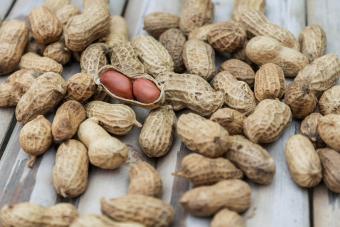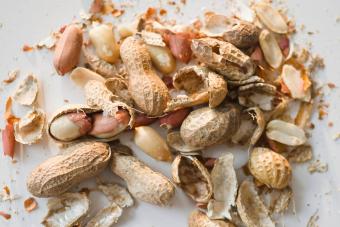
Raw peanuts are peanuts that have not yet been roasted or seasoned. These peanuts have not been exposed to high heat, instead they have been air-dryed and stored, often for use in peanut products. Some people, especially those on a raw food diet, might choose to consume raw rather than roasted peanuts even though there have been reports regarding toxins in them. So, are raw peanuts dangerous?
The short answer is no. There are many myths surrounding raw peanuts and raw peanut butter. Both are usually safe but do have the potential of posing health risks. Learn about the potential risk of toxins in peanuts and why it's important to consume raw nuts in moderation.
Raw Peanut Safety Concerns
Peanuts are legumes. They are not tree nuts, like walnuts or pistachios. Since peanuts are seeds that grow in a pod, they are part of the legume family, even though we commonly refer to them as nuts.
Most raw tree nuts are safe to eat. Peanuts grow underground. When they're harvested, they can be contaminated with Aspergillus flavus, a mold. Aspergillus flavus produces a chemical called aflatoxin, a potential carcinogen that can cause health problems in people and animals.
Aflatoxin
Aflatoxins are metabolites produced by fungus and are one of the most studied toxins in the world. Cornell University has an extensive amount of information devoted to aflatoxin, including occurrence and health risks. Many other reputable universities and scientific organizations also freely share information about aflatoxin.
There are other strains of molds now identified as potential creators of aflatoxin. As part of their life cycle, molds produce and excrete various substances, and these strains excrete aflatoxin. The chemical remains on the raw peanuts after harvesting and may then be consumed by people or animals. If the infected peanuts are made into a product such as raw peanut butter, the aflatoxin also becomes part of the product.
Ingesting aflatoxin may lead to liver failure. If an animal is exposed to aflatoxin in great amounts or over a long period of time, it can cause liver failure and liver cancer. Processing peanuts through heating, roasting, boiling, or pasteurizing the peanut product can reduce the molds, which are killed by high heat, and thus reduce potential aflatoxin exposure. But raw peanuts are not processed.
USDA Guidelines
In most cases, aflatoxin exposure should not be a concern. In the United States, the U.S. Department of Agriculture tests and monitors peanuts moving through production facilities nationwide. If the amount of aflatoxin is greater than 20 parts per billion, they order the peanuts destroyed. Amounts below that are considered reasonably safe. The USDA's monitoring program helps to increase raw peanut safety and also reduces the likelihood that aflatoxin creeps into your jar of peanut butter.
How to Eat Raw Peanuts Safely

Consumers should exercise some care and caution when choosing raw nuts and other legumes for consumption. Government regulation and monitoring reduce the likelihood that toxins are in the bag of raw peanuts, however, like any monitoring program, it catches many problems but may also miss some. Anyone eating peanuts, peanut butter, and peanut products, whether raw or cooked, may take in a little aflatoxin. So, you want to practice moderation.
Be careful about buying peanut products from overseas sources, too. Some countries also have strict monitoring systems in place, but others may not. Cheaper imported products may not always be a good idea.







